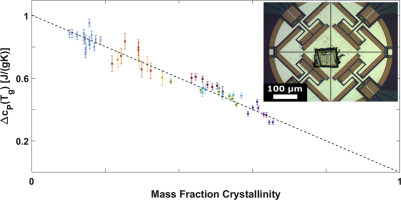Polymer ( IF 4.1 ) Pub Date : 2018-01-05 , DOI: 10.1016/j.polymer.2018.01.004 David Thomas , Evgeny Zhuravlev , Andreas Wurm , Christoph Schick , Peggy Cebe

|
Polyvinyl alcohol (PVA) is a synthetic, semi-crystalline polymer with a wide array of commercial uses ranging from textiles and packaging to medicine. Despite the fact that PVA is in common use, several important thermal properties have not been measured including: 1. temperature dependent liquid state specific heat capacity, cpLiquid(T); 2. specific heat capacity increment of amorphous PVA at the glass transition temperature, Δcpamor(Tg); and, 3. fraction of rigid amorphous phase in semi-crystalline PVA, ϕRA. Two rate-dependent effects have prevented these measurements: PVA thermally degrades at temperatures just in excess of 200 °C which is often within the onset of melting, and PVA crystallizes from the melt so rapidly that it is difficult to obtain fully amorphous polymer. To prevent degradation, and measure these fundamental thermal properties, we have used fast scanning calorimetry at rates ranging from 1000 K/s up to 600,000 K/s. The Mettler Flash DSC1 and a custom-built calorimeter were used to cover this range of heating and cooling rates. We determine the critical cooling rate, βc, needed to quench PVA into an amorphous glass as |βc| = 20,000 K/s. Using FSC in combination with conventional differential scanning calorimetry, we find cpLiquid(T) = ((0.0016 ± 0.0002)*T + (2.3 ± 0.2)) J/(gK). The specific heat capacity increment for fully amorphous PVA is Δcpamor(Tg) = (1.01 ± 0.05) J/(gK). For the semi-crystalline samples used in this study, PVA obeys a two phase model in which ϕRA ∼0. The approaches used in this work are applicable to any semicrystalline polymer or biopolymer which degrades upon heating, or crystallizes so rapidly from the melt that a fully amorphous material cannot be realized.
中文翻译:

快速扫描量热法测定聚乙烯醇的基本热性能
聚乙烯醇(PVA)是一种合成的半结晶聚合物,具有广泛的商业用途,从纺织品,包装到药品。尽管通常使用PVA,但尚未测量到一些重要的热性能,包括:1.与温度有关的液态比热容c p液体(T);在玻璃化转变温度的无定形PVA的2比热容量增量,ΔC p阿莫尔(T克); 3.在半结晶PVA中的刚性无定形相的分数ϕ RA。有两个速率相关的影响阻止了这些测量:PVA在刚好超过熔化温度的200°C以上的温度下热降解,PVA从熔体中结晶出来的速度如此之快,以至于很难获得完全无定形的聚合物。为了防止降解并测量这些基本的热性能,我们使用了快速扫描量热法,速率从1000 K / s到600,000 K / s不等。使用Mettler Flash DSC1和定制的量热仪来覆盖该范围的加热和冷却速率。我们确定的临界冷却速度,β Ç,以淬灭PVA成无定形玻璃根据需要| β Ç | = 20,000 K / s。使用FSC结合常规差示扫描量热法,我们发现c p液体(T)=((0.0016±0.0002)* T +(2.3±0.2))J /(gK)。为完全无定形的PVA的比热容量增量ΔC p阿莫尔(T克)=(1.01±0.05)的J /(GK)。对于本研究中使用的半结晶样品,PVA服从的两两相模型,其中φ RA〜0。这项工作中使用的方法适用于任何半结晶聚合物或生物聚合物,这些半结晶聚合物或生物聚合物在加热时会降解,或者从熔体中快速结晶,以致无法实现完全无定形的材料。











































 京公网安备 11010802027423号
京公网安备 11010802027423号